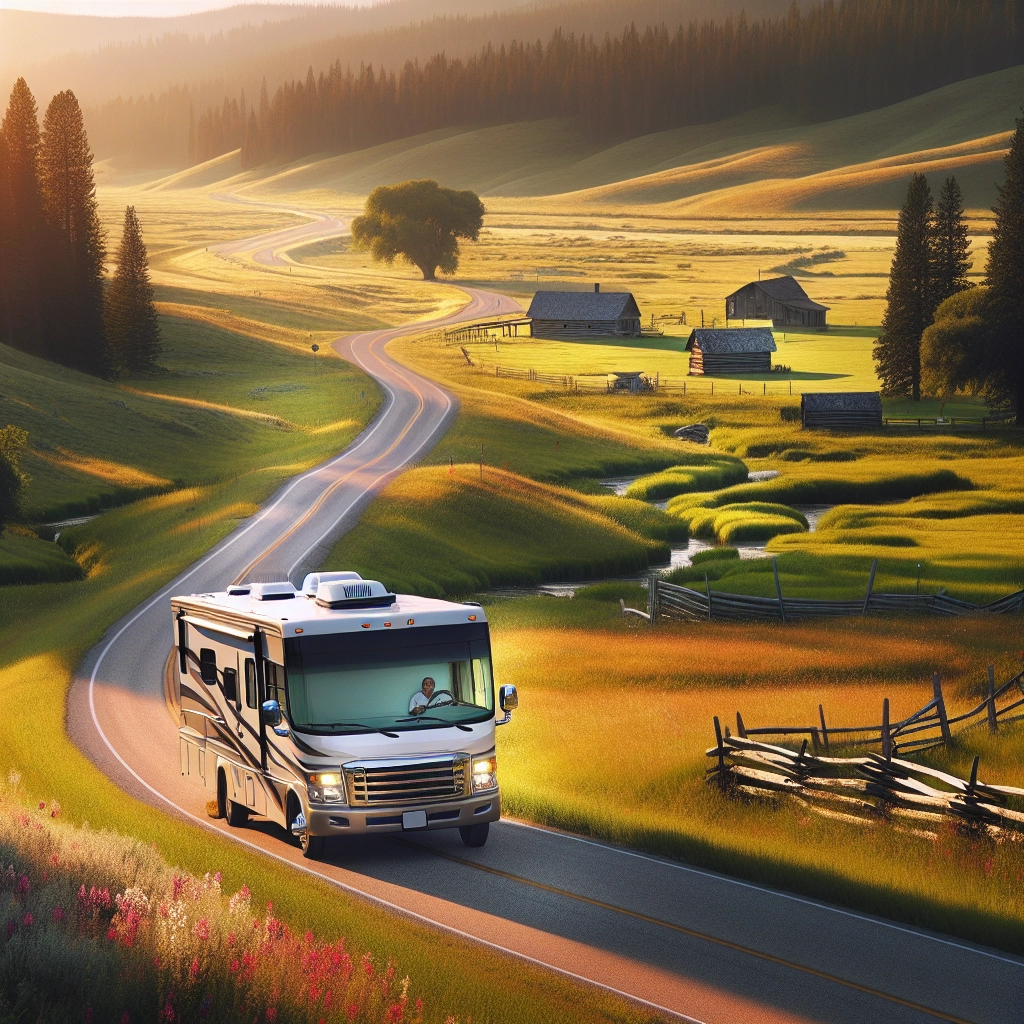Table of Contents

The Solar Decision: Roof vs. Portable Panels for RVs
When you’re on the road in your RV, freedom is your north star. Solar power can be the wind in your sails, offering independence from the grid and a greener way of life. But when it comes to choosing between roof-mounted and portable solar panels, it’s not just about picking the most advanced gear—it’s about what fits your journey. Let’s navigate these waters together and find the solar solution that keeps your adventures powered up.
Key Takeaways: Article-at-a-Glance
- Roof-mounted panels offer convenience and a low profile, but installation can be complex.
- Portable panels provide flexibility and ease of use, ideal for those who park in the shade.
- Understanding the pros and cons of each type helps you make an informed decision for your RV lifestyle.
- Energy needs, RV size, and travel habits are critical factors in choosing the right solar setup.
- Maintenance, cost, and efficiency are important considerations in the long-term value of your solar investment.
Understanding Roof-Mounted Solar Panels
Imagine harnessing the sun’s power as you cruise down the open road. Roof-mounted solar panels make this dream a reality by providing a steady stream of energy to your RV. These panels are securely attached to the top of your rig, capturing sunlight as you explore. They’re a popular choice for their sleek integration and ‘set it and forget it’ appeal.
Benefits of a Permanent Solution
Roof-mounted solar panels are like faithful travel companions. Once installed, they’re always there, soaking up the sun’s rays and charging your batteries. They don’t take up extra space, and there’s no setup required each time you stop. Best of all, they’re out of sight and out of mind, leaving you more time to enjoy the great outdoors.
Challenges of Roof Installation
But let’s be real, the road to solar can have a few bumps. Installing roof-mounted panels means drilling into your RV’s roof, which can be daunting. You need to ensure a watertight seal to avoid leaks. Plus, the initial cost and installation can be higher compared to portable options. And once they’re up, they’re not easy to adjust for optimal sun exposure.
Navigating the World of Portable Solar Panels
Now, let’s talk about portable solar panels. They’re the adventurers of the solar world—ready to move with the sun and adapt to your needs. Whether you’re parked under the cool shade of a tree or soaking up the sun by the lake, portable panels can be positioned for maximum sun exposure, ensuring your batteries stay charged.
Advantages of Portability
- Move panels to capture optimal sunlight throughout the day.
- Easy to store and set up, with no permanent installation required.
- Ideal for those who frequently change locations or park in shaded areas.
- Can be used to supplement a roof-mounted system for extra power when needed.
- Less risk of theft or damage, as they can be packed away when not in use.
Portable solar panels give you the freedom to chase the sun. They’re perfect for those spontaneous moments when you decide to park in a shaded spot to escape the afternoon heat. Just set them up in a sunny area, and you’re good to go. Plus, they’re a great backup for those days when the clouds just won’t clear.
Drawbacks of Going Portable
However, portable panels aren’t without their quirks. They require a bit of elbow grease to set up and take down, which might not be everyone’s cup of tea. And while they’re flexible, they also need to be monitored and moved to track the sun, which can take time away from your relaxation. Lastly, they can take up valuable storage space in your RV when not in use.
Stay tuned as we dive deeper into the efficiency, cost, and practicality of both options. We’ll help you chart a course toward the solar setup that’s just right for your RV lifestyle, ensuring you’re powered up and ready for wherever the road takes you.

Deciphering the Pros and Cons
Choosing the right solar panels for your RV isn’t just about sunny days and battery levels—it’s about understanding the balance of benefits and drawbacks that come with each type. Let’s break down the pros and cons to help you make a choice that’s as informed as it is inspired. For more detailed information, consider reading about how to choose the perfect RV solar battery.
Pros of Roof-Mounted Solar Panels
- Aesthetically pleasing as they blend with the RV’s roofline.
- Once installed, they require minimal effort to use.
- No need to sacrifice valuable storage or living space.
- Less vulnerable to theft or damage since they’re out of reach.
- Can be more aerodynamic, reducing drag while driving.
Cons of Roof-Mounted Solar Panels
- Installation can be complex and may require professional help.
- Difficult to adjust for optimal sun exposure once installed.
- Can be less efficient if the RV is parked in shaded areas.
- May require additional hardware to tilt towards the sun.
- Higher upfront costs due to mounting equipment and installation.
Pros of Portable Solar Panels
- Flexibility to place panels in direct sunlight, even if the RV is shaded.
- Easy to install and use—no drilling or complex wiring required.
- Can be expanded or upgraded with additional panels over time.
- Portable systems can be shared between multiple RVs or used for other applications.
- Great for renters or those who aren’t ready to commit to a permanent installation.
Cons of Portable Solar Panels
- Require manual setup and takedown, which can be time-consuming.
- May take up valuable space when not in use and during transport.
- More susceptible to theft or damage if left unattended.
- Can be less efficient in windy conditions due to instability.
- Generally have lower power output compared to roof-mounted systems.
Detailed Comparison: Efficiency and Cost
When the rubber meets the road, it’s not just about choosing a solar panel—it’s about choosing a lifestyle. Let’s get into the nuts and bolts of efficiency and cost so you can steer your solar investment in the right direction.
Cost-Benefit Analysis of Both Options
Roof-mounted panels may have a higher initial price tag, but they’re a one-time investment with long-term benefits. The lack of setup and takedown means less wear and tear, potentially extending the life of your system. On the flip side, portable panels offer a lower entry cost and the ability to scale up as your budget allows. It’s a trade-off between convenience and flexibility.
Energy Output and Efficiency Factors
Efficiency isn’t just a buzzword—it’s the heart of your solar setup. Roof-mounted panels are fixed, which means they might not always be at the optimal angle for sun exposure. Portable panels, however, can be moved throughout the day to maximize energy absorption. But remember, this requires effort and attention. The best choice depends on how you balance efficiency with ease of use.
As we’ve seen, both roof-mounted and portable solar panels have their place under the sun. The key is to match your choice with your RV lifestyle, energy needs, and how you like to spend your time. Whether you’re looking for a ‘set it and forget it’ system or a flexible, hands-on approach, the power to choose is yours.
Adaptability and Flexibility in Usage
Let’s face it, your RV is more than just a vehicle—it’s a way of life. And just like life, your energy needs can change. That’s where adaptability and flexibility become crucial. Whether you’re parked for a week or just stopping for the night, your solar panels should complement your lifestyle, not complicate it.
Parking and Placement Constraints
Every campsite has its own character—some are sunny open spaces, others are cozy nooks under a canopy of trees. Roof-mounted panels are at the mercy of where you park. If you’re covered by shade, they won’t do much good. Portable panels give you the freedom to place them wherever the sun is shining, ensuring you get the power you need, no matter where you’re parked.
Adjusting to Environmental Conditions
Weather can change on a dime, and with it, your solar panel’s efficiency. A roof-mounted system is a bit like setting sail with a fixed rudder—you’re going in one direction, come rain or shine. Portable panels, however, are like having oars in the water; you can adjust your course as needed. When the clouds roll in, simply move your portable panels to a spot that still catches light.
Installation and Maintenance
Getting your solar panels up and running should be as smooth as a drive on the open highway. With the right tools and a bit of know-how, you can set yourself up for years of solar-powered adventures.
Setting Up Your Solar Solution
Roof-mounted panels might require a bit more elbow grease and technical savvy to install, but once they’re up, they’re a low-maintenance dream. Portable panels are the plug-and-play of solar solutions. Just unfold, set them in the sun, and plug them into your RV. No drills, no holes, no fuss.
Long-Term Care and Upkeep
Maintenance is like keeping your RV’s engine tuned: it’s essential for a smooth ride. Roof-mounted panels need a check-up now and then to ensure they’re clean and free of debris. Portable panels also need love, especially since they’re handled more often. A gentle wipe down and a once-over before and after use will keep them charging like champions.

Customizing Solar Solutions for Your RV Lifestyle
Your RV is your castle on wheels, and just like any home, it needs to fit you perfectly. The same goes for your solar setup. Customizing your solar solution means considering how you use your RV, where you go, and what you want to power. It’s about making solar work for you, not the other way around.
Evaluating Your Energy Needs
Start by taking stock of your energy needs. How much power do you use daily? What appliances are must-haves on your trips? Do you need enough juice to power a laptop and lights, or are you looking to run an air conditioner? Once you know your energy needs, you can tailor your solar panel system to meet them, ensuring you have the power you need, when and where you need it.
Remember, the best solar solution is the one that fits your unique RV lifestyle. Whether you’re a weekend warrior or a full-time road tripper, your energy needs are as individual as your travel itinerary. By taking the time to understand those needs, you can build a solar system that keeps up with you, every mile of the journey.
Matching Solar Options with Travel Habits
Think of your solar panels as your travel companions—what you choose should sync up with your travel rhythm. Are you the type to stay put in one spot, soaking in the surroundings? Roof-mounted panels might be your best bet. Or do you hop from shadow to sunshine, always on the move? Then portable panels could be your ace in the hole. It’s about aligning your solar setup with your travel tempo.
Making the Informed Choice
The road to solar is paved with choices, and the best decision is an informed one. It’s not just about the panels themselves; it’s about how they fit into your RV life puzzle. Weighing the pros and cons, considering your budget, and understanding your energy needs are all part of the journey to finding the perfect solar match.
Scenario Analysis for Best Solar Fit
Let’s play out a few scenarios. If you’re a summer traveler, chasing the sun across the country, portable panels might give you the flexibility you crave. But if you’re living full-time in your RV, roof-mounted panels could offer the convenience and reliability you need. Think about where you’ll be, what the weather will be like, and how much energy you’ll use. Your best solar fit is out there.
Getting Expert Consultation
Sometimes, you need a co-pilot. When it comes to solar, an expert can help navigate the technical terrain. They can assess your RV’s roof, crunch the numbers on your energy consumption, and recommend the best setup for your needs. Don’t shy away from getting a helping hand—it could save you time and money in the long run.
Future-Proofing Your Solar Investment
Solar technology is always on the move, just like you. Future-proofing your investment means choosing panels that can grow with you. Maybe that’s a portable system that allows for easy upgrades or a roof-mounted setup that’s built to last. Think about where you’ll be in five, ten, or fifteen years. Will your solar choice still make sense? Plan for tomorrow’s roads today.
Final Words: Embracing Solar Power on Your Terms
At the end of the day, it’s about powering your journey on your terms. Whether you choose roof-mounted or portable solar panels, you’re taking a step towards energy independence and a greener way of RV life. Embrace the freedom of the open road and the power of the sun. It’s your adventure, solar-charged.
Frequently Asked Questions (FAQ)
What maintenance is required for roof-mounted solar panels compared to portable ones?
Roof-mounted solar panels need a good cleaning now and then to keep them at peak performance—think of it as giving your RV a wash. Clear off leaves, dust, and bird droppings with a soft brush or cloth. Portable panels, while more hands-on during setup, are just as easy to maintain. A simple wipe down after use will do the trick. Both types benefit from a visual inspection to catch any potential issues early on.
How does the weather affect the efficiency of roof vs. portable solar panels?
Weather plays a big role in the efficiency of your solar panels. Roof-mounted panels are exposed to the elements 24/7, which means they can be affected by everything from heavy snowfall to dust storms. They’re built tough, but their stationary position can limit their performance under certain conditions. Portable panels, while more vulnerable to weather damage if not secured properly, can be moved to more protected locations or angled to catch every possible ray of sunshine, even on cloudy days.
Can portable solar panels be left outside during harsh weather conditions?
Portable solar panels are designed for the outdoors, but they’re not indestructible. In harsh weather conditions like high winds or hail, it’s best to pack them up and store them safely inside your RV. This not only protects your panels from potential damage but also ensures they continue to work efficiently for your next sunny adventure. Always check the manufacturer’s guidelines for specific weather-related advice.
Is it possible to combine both roof-mounted and portable solar panels on an RV?
Absolutely! Combining roof-mounted and portable solar panels can give you the best of both worlds. The roof-mounted panels provide a steady base of power, while the portable panels can be used to supplement your energy needs, especially when parked in less-than-ideal conditions for solar exposure. This hybrid approach can maximize your energy production and provide a more robust and flexible solar system for your RV.
How much cost can I expect to save in the long run by switching to solar energy for my RV?
Switching to solar energy for your RV can lead to significant savings over time. While the initial investment in solar panels can be substantial, the reduction in generator use, fuel costs, and campground electrical hook-up fees means your solar setup can pay for itself. The exact amount you’ll save depends on your energy usage, the efficiency of your panels, and how often you’re off the grid. But rest assured, the sun’s energy is free, and with solar panels, you’ll be cashing in on those savings every sunny day.
In conclusion, the journey to choosing the right solar panels for your RV is a personal one, shaped by your travel style, budget, and energy needs. Roof-mounted and portable solar panels both have their place in the world of RV solar power, and understanding their pros and cons is key to making an informed decision. Whether you opt for the sleekness and convenience of roof-mounted panels, the flexibility and adaptability of portable panels, or a combination of both, you’re on the path to a more sustainable and independent RV lifestyle.
Embrace the freedom that solar power brings to your travels. With the right setup, you can enjoy the great outdoors with all the comforts of home, knowing that you’re doing your part for the environment. So charge up, hit the road, and let the sun guide you to your next adventure.
- Boondocking RVs: Flexible Solar Solutions – 3 March 2024
- Renewable Energy Tips for Full-Time Boondocking RVers – 2 March 2024
- Boondocking Solar Power Systems: Sizing Options & Solutions for Motorhomes – 1 March 2024
